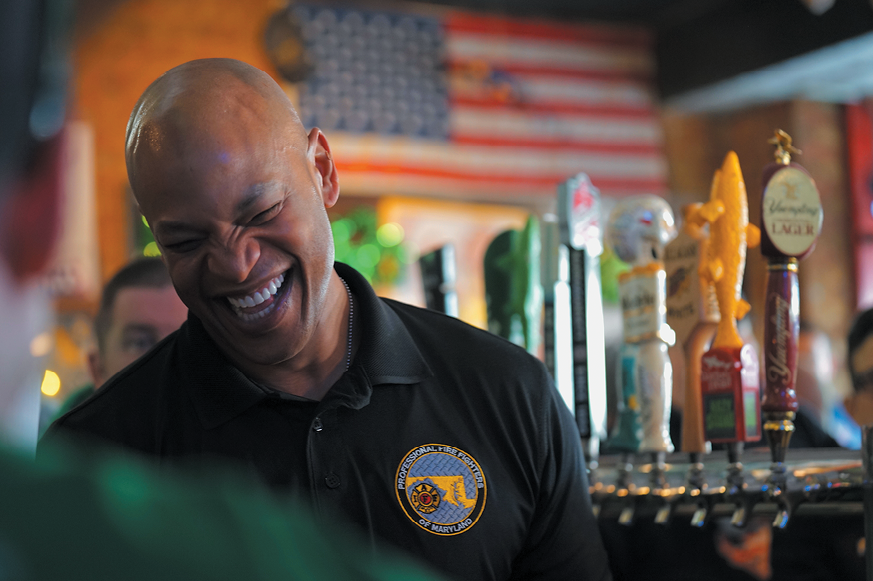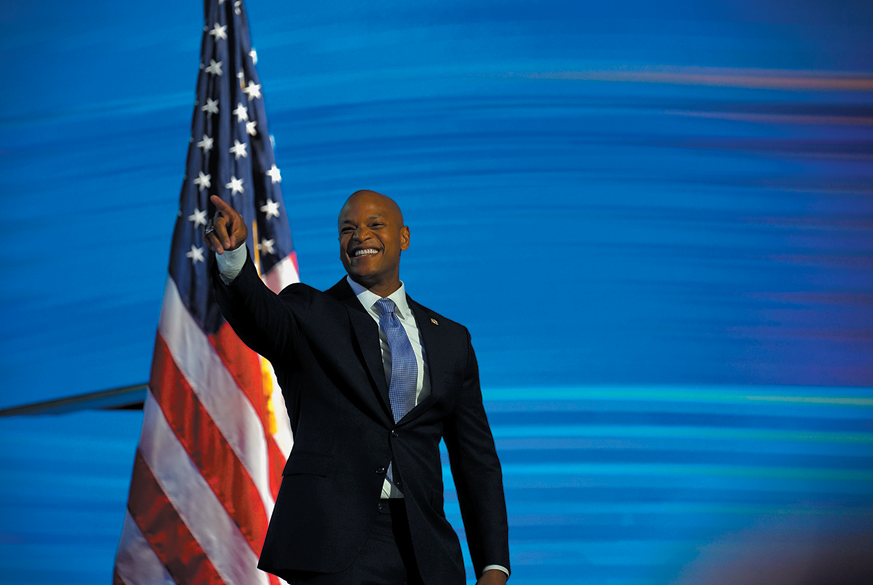- Home
- Media Kit
- MediaJet
- Current Issue
- Past Issues
- Ad Specs-Submission
- Reprints (PDF)
- Photo Specifications (PDF)
- Contact Us
- PRIVACY POLICY
- TERMS OF USE
![]()
ONLINE
![]()
ONLINE

Team Maryland
Editors’ Note
Wes Moore is the 63rd Governor of the state of Maryland. He is Maryland’s first Black governor in the state’s 246-year history, and is just the third African American elected Governor in the history of the United States. Moore is a proud graduate of Valley Forge Military Academy and College, where he received an Associate’s degree in 1998, and was commissioned as a second lieutenant in the U.S. Army. Afterward, he went on to earn his bachelor’s degree in international relations and economics at Johns Hopkins University in Baltimore, where he graduated Phi Beta Kappa. While at Johns Hopkins, Moore interned in the office of former Baltimore Mayor Kurt Schmoke. Moore was the first Black Rhodes Scholar in the history of Johns Hopkins University. As a Rhodes Scholar, he earned a Master’s in international relations from Wolfson College at Oxford. In 2005, Moore deployed to Afghanistan as a lieutenant with the 82nd Airborne Division, leading soldiers in combat. Immediately upon returning home, Moore served as a White House Fellow, advising on issues of national security and international relations. In 2010, Moore wrote The Other Wes Moore, a story about the fragile nature of opportunity in America, which became a perennial New York Times bestseller. He went on to write other best-selling books that reflect on issues of race, equity, and opportunity, including his latest book, Five Days, which tells the story of Baltimore in the days that followed the death of Freddie Gray in 2015. Moore built and launched a Baltimore-based business called BridgeEdU which reinvented freshman year of college for underserved students to increase their likelihood of long-term success. BridgeEdU was acquired by the Brooklyn-based student financial success platform, Edquity, in 2018. It was Moore’s commitment to taking on the toughest challenges that brought him to the Robin Hood Foundation, where he served for four years as CEO. During his tenure, the Robin Hood Foundation distributed over $600 million toward lifting families out of poverty, including in Maryland. While the Robin Hood Foundation is headquartered in New York City, Moore and his family never moved from their home in Baltimore. Moore has also worked in finance with Deutsche Bank in London and with Citigroup in New York.

Governor Moore at Stan and Joe’s Saloon in
Annapolis, Maryland with local firefighters
Will you discuss your career journey?
I am likely the most improbable governor in the country. There is nothing in my life that at any point made me or anyone for that matter think I could be the Governor of Maryland. But, fortunately for me, I’ve had some really influential people in my life that have lifted me up. Whether it is my mom, who raised me as a single mother; Kurt Schmoke, who I interned for in Baltimore; or Lt. Gen. Fenzel, my commanding officer when I served in the Army, I have had some incredible people that have really helped my journey through life.
From serving in the Army, to leading one of the nation’s largest poverty fighting organizations, to now as the Governor of Maryland, my career journey has always been led by a desire to serve, and I am blessed to be able to do that in my home state.
What attracted you to public service?
There have been several moments throughout my life that have driven me toward a life of public service; the passing of my father, the labor of love my mother exerted after his passing, my service in the Army, leading one of the largest poverty fighting organizations in the country, and now serving as the 63rd Governor of Maryland. Each one of these moments have widened my understanding of why service matters and deepened my passion for serving others.
I’ve been blessed to work alongside true public servants in every sense of that word throughout my entire life. When I think about why I made the choice to serve, I’m brought back to those moments in my life when people came to support me, my family, and my community – without being asked. These tragedies, stories of hard work, and these opportunities are what have developed my love for public service throughout my life and what continues to drive me to serve others today.
Will you highlight the priorities for your administration?
In the military, I learned the creed that all of us who have worn the uniform of this country live by: Leave no one behind. Our priority is to create a Maryland that leaves no one behind – it’s not just a campaign slogan; it’s a governing philosophy. We want to create a stronger and more inclusive state by building an innovative and dynamic economy that tackles the challenges of today and tomorrow, makes our communities safer with targeted investments in public safety, and ensures Maryland wins the decade by building a more sustainable state for all.

Governor Moore walking on stage to speak at the
2024 Democratic National Convention
How do you describe Maryland’s strengths?
I have long said that Maryland is asset rich, but strategy poor – that is finally changing. In the last two years, we have added nearly 100,000 jobs, more jobs than the last administration created in eight. Under the Moore-Miller Administration, violent crime and non-fatal shootings are the lowest they’ve been in a decade, according to preliminary data. After eight straight years of 300+ homicides in Baltimore City, under our administration the city has now experienced historic drops in homicides with rates the lowest they’ve been in more than a decade.
But Maryland’s biggest strength has been and will always be its people and their resiliency. We’ve seen their spirit on full display in the past several years, but perhaps most following the collapse of the Francis Scott Key Bridge. When they told us the channel would be cleared in around 11 months, we did it in 11 weeks because Marylanders from across the state banded together to get the job done.
How important is a strong public/private partnership in Maryland?
As a former small business owner, I know how important it is to create an economy that works for everyone – especially for our small businesses that make up an overwhelming majority of the businesses in Maryland. It is essential that we work in partnership with the business community to create the innovative economy that we all know is possible. We need to be doing things that grow our economy from the bottom up and the middle out. That’s how we build stronger pathways to prosperity and strengthen the foundation our state stands on.
In our first year, we delivered $1.4 billion to MBE’s through the Board of Public Works. We’ve also improved access to banking for small businesses, so our entrepreneurs of color can get the liquidity they need to get an idea off the ground. Maryland is home to the largest number of certified minority business enterprises in the nation. We’re also home to the second highest share of women-owned businesses. This year, we’re focused on building on our successes to make Maryland a destination of choice for entrepreneurs and businesses.
We’re increasing funding for critical state programs like the Build Our Future Program to support new companies on the leading edge of innovation. We’re bolstering support for the Manufacturing 4.0 Program to build out advanced manufacturing in our state. We’re proposing new investments in BioHub Maryland and CyberMaryland, to strengthen the talent pipeline to jobs in cyber and biotech.
This session, I introduced the Procurement Reform Act. It creates a more fair, transparent, and efficient procurement process, and expands opportunities for small, minority, women, and veteran-owned businesses to compete for state contracts.
In order to build an innovative economy that will tackle the challenges of today and tomorrow, we must equip our businesses with the tools they need to succeed and foster a working relationship with the private sector that benefits all Marylanders.
“But in the face of chaos, Team Maryland remains committed to leading with clarity, calm, and courage.”
Will you discuss your administration’s focus and commitment to transparency?
As public servants, transparency and accountability always remain at the forefront of the work that we do, and this year we have made some real strides to ensure even more transparency throughout our administration and in the state government. When I entered office, I announced that I was putting all of my assets in a blind trust to ensure there wasn’t even a possibility of a conflict of interest. Now, I’ve signed legislation that requires the Governor of Maryland to either divest from any conflicts of interest or place their interests into a blind trust. This will ensure any governor makes decisions in the best interests of the people – not themselves. Maryland is now one of the first – if not the first – state in the nation to codify this kind of guardrail on the chief executive – because nobody should be able to use the office of governor as a get-rich-quick scheme, for them or their family.
What advice do you offer to young people beginning their careers?
The biggest advice that I can give to our young people is that you will never look back on life and say “I wish I didn’t try that hard.” I can promise you, it’s the opposite, you’ll always wish you tried even harder. When you go to bed at the end of every day, you want to do it knowing you did everything you can that day to put yourself in a place to succeed.
When you look to the future, what excites you the most, and what concerns you the most?
What excites me the most is the potential of Maryland. This is a place with unlimited potential – it’s why we’re investing in things like quantum, to build the economy of the future.
What concerns me the most is that we have a cruel administration in Washington that is hell bent on making the most vulnerable pay the highest price.
But in the face of chaos, Team Maryland remains committed to leading with clarity, calm, and courage. Marylanders are resilient, and together we will work to ensure that the aspirations of all Marylanders are being prioritized.![]()